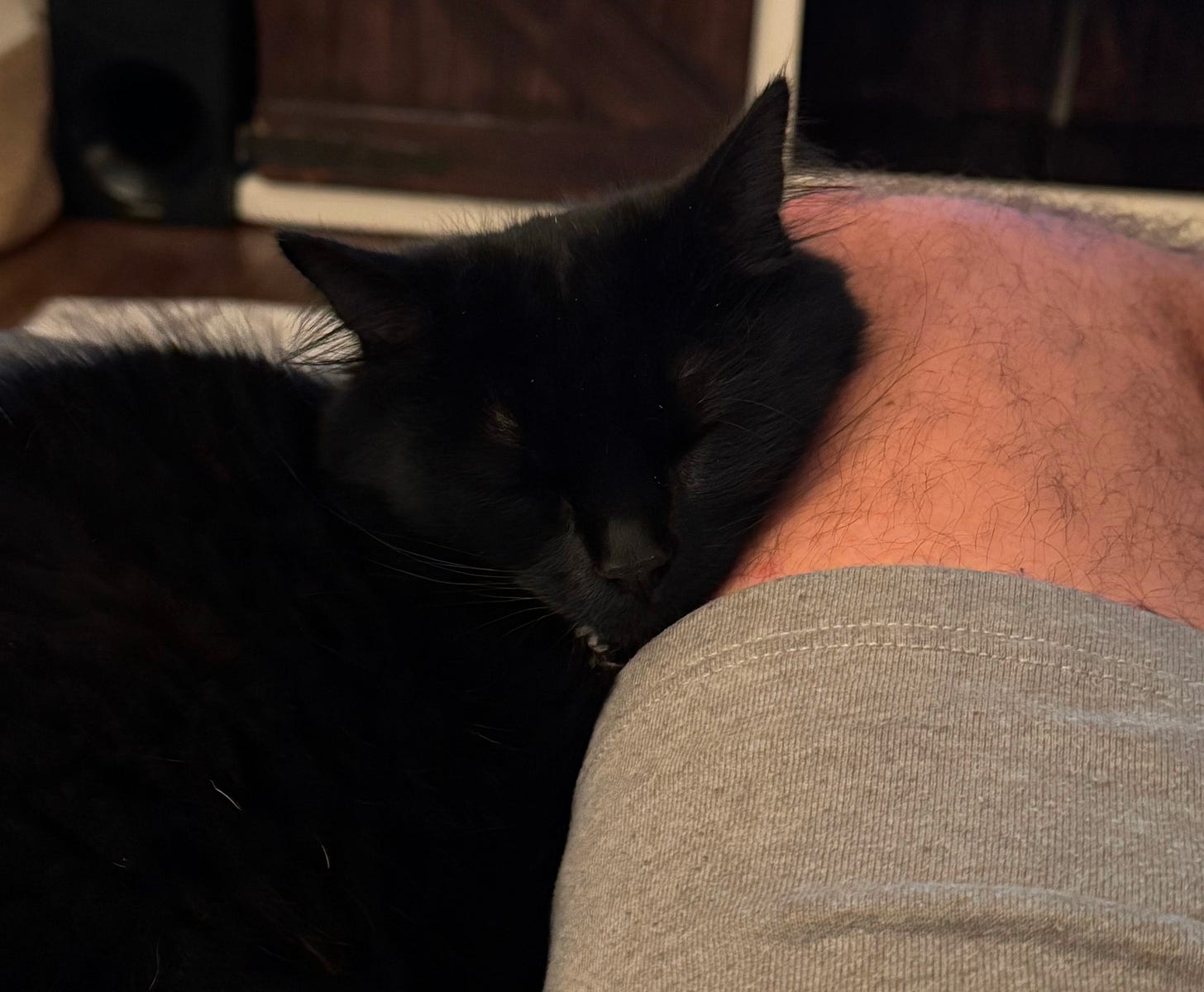Wayward Reflection (003)
The Consequence of Conscience. What Leaders Forgot to Heal.
Hey there and welcome to another random reflection piece. This one came after a coaching session today that I wanted to get out before I went into the weekend. As always, writing helps me see what I actually think. It forces me to turn feelings into language, and language into clarity. This Substack is us working in public as we continue to dive into moral injury. This thought is along the lines of what we are calling moral presence. Enjoy.
Oh, and one last thing before you begin, feel free to share, and if something here helps you, take it. If it doesn’t, leave it. Either way, we are glad you’re here.

Moral Bedside Manners
The photo above is from when I called myself an agnostic during my faith journey.
A base chaplain saw something I couldn’t. He chose me to lead all the student chapel ropes on base.
Funny thing is a few months earlier, I’d lost another rope. The green one, a rope that designated you as a student leader. I took the blame to protect people I trained with, and leadership called it a lack of core values. Said I didn’t deserve to lead.
I believed I’d acted with integrity. They said I’d failed. They took the rope.
Out of frustration, or maybe faith, I wandered into the chapel. The chaplain listened and said:
“You led the way God teaches us to lead—putting others before yourself.”
Months later, I stood there again. New place. New rope. New role.
Not a comeback. A correction.

Looking back, that moment taught me something I couldn’t have understood back then because I wasn’t ready. However, the lesson I know now is real authority doesn’t come from a stripe, a rope, or a title. It comes from presence. From standing in the space where trust has broken, refusing to turn away, and continuing forward with a sense of higher purpose.
This memory surfaced during a coaching session this week. It reminded me what it means to lead through moral injury. Our own or another’s.
We’ve all known both kinds of doctors. The hurried ones who treat symptoms, not people. And the rare ones who understand that the body can’t heal if the person doesn’t feel safe. Healing begins with presence, empathy, clarity, and care.
Leadership is no different. Leaders need a kind of moral bedside manner. The capacity to see a person not as a problem to fix but as a human being to understand. We at Wayward Purpose call this Moral Presence.
Where a physician tends the body, a moral leader tends the soul. Not through authority, but through intentional moral listening. The kind that says, “You still belong, even here. You still matter.”
It starts in the smallest gestures of nonjudgmental listening, genuine curiosity, transparency, consistent communication, and ethical modeling. This is what people mean when they say they’re waiting for leadership to “show them what right looks like.”
The Wound Beneath the Uniform
In other articles we talk about moral injury isn’t always about what someone did or didn’t do. Often, it’s what was done to the person. It is a betrayal of trust, a failure to see the soul behind the salute.

Scholars define moral injury as a betrayal of what is right by legitimate authority in a high-stakes context. In simpler terms, it happens when someone you trusted with your life, your purpose, or your conscience turns around and violates that trust. Sometimes the source isn’t an enemy, but a leader you know. A NCO, a chaplain, a commander, even the institution itself.
So how does leadership repair what leadership once broke?
Too often, we get it wrong. We patch people up and send them back into the same environment, congratulating ourselves for helping. When all we’ve done is treat a symptom. I’ve done it myself. I’ve told people to “move on,” to “stay resilient,” believing I was doing good. In truth, I was easing my discomfort more than their pain. I’m still learning to reconcile those moments of dismissing others.
We dress the wound but never remove the sharp edges that keep reopening it.
Moral injury is not fear-based like PTSD. It’s not a reflex of the nervous system; it’s a fracture of the moral self — a wound of conscience.
When someone says, “Just let me separate. Retire. Be done.” That’s not apathy speaking. That’s moral injury saying it can’t find a safe place to heal. And if you’ve ever said it yourself, you probably know why.
Why Care About Moral Injury
At Wayward Purpose, our focus is on current and former service members grappling with the psychological and spiritual aftermath of a shattered moral identity. The guilt, shame, and betrayal that grind meaning to dust. Yet this is not solely a military story. It’s a human one. It is not about us, but about we.
Anyone who has ever lived by a moral code of integrity, loyalty, duty, or devotion; and later found themselves longing for trust, forgiveness, or belonging will recognize this terrain. This space is for those carrying quiet shame, paralyzing guilt, or the exhaustion that comes from fighting despair alone. For those who, like me, reached for numbing habits (alcohol, overwork, distraction) because we didn’t know how else to silence the noise. Or, in some cases bring noise to the silence.
Most who carry moral injury aren’t seeking pity. We don’t need saving. What we’re searching for is reconciliation. A way to reforge discipline into healing, to feel clean again on the inside, to believe we are still worthy of love, respect, and purpose.
You can tell someone they matter a hundred times, but if they no longer feel it, especially from the people or institutions that once gave their life meaning, the words echo hollow. They fade beneath the internal noise of a moral battle still being fought.
The greatest barrier to healing is rarely access to care. It’s trust. And trust doesn’t return through systems or slogans. It returns through presence. When someone meets us in our pain with honesty, humility, and shared humanity. That’s where leadership becomes moral.
The Disconnect
At Wayward Purpose, we’ve come to see that at the heart of moral injury lies moral dissonance. The war between who you believed you were and what reality forced you to become.
“I did what I was trained to do.”
“But I can’t live with what I did.”
This tension isn’t weakness. It’s the logic of a wounded conscience trying to survive. It sounds like this:
Authority that demanded obedience at the cost of conscience.
Self-deception that once kept you alive but now robs you of rest.
Betrayal that shattered your belief that the world was fair or that leadership could always be trusted, or had your best interest in mind.
Self-punishment that feels like repayment for a debt no one else can see.
Emotionally, it manifests as shame, guilt, grief, and anger. Psychologically, it’s the collapse of trust; in yourself, in others, even in God.
This is the quiet battlefield of moral injury, where duty once gave direction and now only silence answers back. Yet within that silence, the beginning of healing can often be found.
I learned this years ago through the “Five Whys” exercise in therapy. It helped me peel back the layers of my own drinking problem in my early twenties:
“I drink because I’m bored.”
Why? Because I hate downtime.
Why? Because that’s when the memories come back.
Why? Because I think what I did was unforgivable.
Why? Because I fear my family will see who I really am, and stop loving me.
By the fifth why, I’d reached the core: shame and guilt masquerading as habit. The drinking wasn’t the issue. The drinking was the evidence.
Even now, after years of growth, a recent moment reopened that old wound. A leader questioned my honesty when I said I hadn’t had a drink in months. That disbelief cut deep, and what followed cut even deeper. It dismissed the very mountain I’d already climbed. Took my trust and destroyed it even further. Back then, I didn’t know the word moral injury. Now I do, and I understand the terrain.
The pattern is universal: emotional struggle → surface complaint → buried feeling → consequence. It lives in thousands of us:
Isolation & Alienation → “I just need space.” “No one gets it.” → Shame: I’m unworthy of belonging → Disconnection and family strain.
Self-Condemnation → “I don’t deserve success.” “I drink to sleep.” → Guilt: I’m tainted → Demoralization and self-sabotage.
Existential Disorientation → “The mission was meaningless.” “Leaders failed us.” → Loss of faith and moral clarity → Despair.
Inability to Cope → “I stay busy.” “I try not to think.” → Avoidance masking unbearable pain → Risk of moral despair or suicide.
Moral injury can end up turning life’s deepest pursuits and driving factors into their own undoing:
The will to survive becomes a belief that suicide is control.
The longing for relief turns numbing into a substitute for healing.
The desire to protect loved ones transforms shame into isolation.
Those who once gave everything for meaning now find themselves trapped at the bottom of their own moral pyramid. Fighting to survive what they once served.

Closing Thought
Alright. We’ve written more than we planned to, but we will leave you with this.
A doctor’s bedside manner builds trust so the body can heal. A leader’s version of that is Moral Presence. The courage to stay with another’s pain without hiding behind rank, title, or platitude.
Just show up. See people as people.
Care. Because bureaucracies can’t.
A moral leader builds trust for moral repair through listening, genuineness, and ethical modeling. These are the antidotes to shame, guilt, and isolation. Through them, a person can begin to rebuild faith, discipline, and direction.
Moral Presence means:
Countering shame with witness.
Restoring moral clarity through integrity.
Doing no further harm by recognizing moral pain for what it is.
We can’t order moral healing.
We can only offer your humanity.
To every leader reading this: your moral bedside might be the only place someone finds the courage to speak the truth that’s been burning inside them.
Imagine how many lives could be saved if more of us learned to see the person first.
We don’t need to fix it. We only need to be real enough to stay in the room.
This is where our work at Wayward Purpose continues.
Helping leaders move from moral injury to moral leadership.
Together, we’re building the trust, language, and courage it takes to make suicide not even an option to consider.
If you lead (in uniform, in ministry, in communities, or at home) ask yourself this:
When was the last time you sat beside someone’s pain instead of trying to fix it?
That’s moral leadership. That’s moral medicine. That’s where healing starts.
At Wayward Purpose, we’re not here to treat symptoms. We’re here to help people rewrite the story of a shattered self. One conversation at a time.
Feel free to stay with us on this continued journey as long as you want.
Subscribe, share, and join the mission.
One last note if you made it this far.
As Veterans Day approaches, take care of one another and yourselves.
The more people who find this space and mission, the more I realize how many are still quietly hurting. Not broken. Just tired. Still carrying what no one sees. And for some, this space becomes a waypoint. A place to finally name what they’ve been feeling. And naming it is where healing begins.
I don’t have all the answers. Maybe none of us do.
But we can promise this:
We’ll keep holding the flame high.
We’ll keep learning, researching, and writing.
And when someone’s light begins to fade, we’ll stop to help relight it.
That’s what Wayward Purpose means to us. That’s why we keep showing up.
If any of this hits you, or if you just want to say hey, feel free to reach out to us at: we@waywardpurpose.com.
And don’t forget to scroll down for the ‘cat tax’ and have a great weekend.



